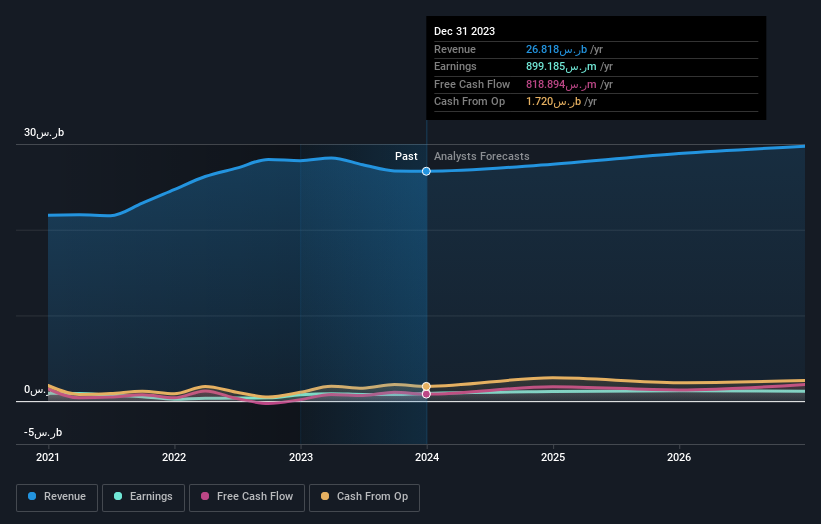- Saudi Arabia
- /
- Food
- /
- SASE:2050
While private companies own 26% of Savola Group Company (TADAWUL:2050), individual investors are its largest shareholders with 60% ownership

Key Insights
- Significant control over Savola Group by individual investors implies that the general public has more power to influence management and governance-related decisions
- A total of 25 investors have a majority stake in the company with 40% ownership
- Analyst forecasts along with ownership data serve to give a strong idea about prospects for a business
A look at the shareholders of Savola Group Company (TADAWUL:2050) can tell us which group is most powerful. The group holding the most number of shares in the company, around 60% to be precise, is individual investors. Put another way, the group faces the maximum upside potential (or downside risk).
Meanwhile, private companies make up 26% of the company’s shareholders.
Let's delve deeper into each type of owner of Savola Group, beginning with the chart below.
See our latest analysis for Savola Group

What Does The Institutional Ownership Tell Us About Savola Group?
Institutional investors commonly compare their own returns to the returns of a commonly followed index. So they generally do consider buying larger companies that are included in the relevant benchmark index.
We can see that Savola Group does have institutional investors; and they hold a good portion of the company's stock. This implies the analysts working for those institutions have looked at the stock and they like it. But just like anyone else, they could be wrong. If multiple institutions change their view on a stock at the same time, you could see the share price drop fast. It's therefore worth looking at Savola Group's earnings history below. Of course, the future is what really matters.

Hedge funds don't have many shares in Savola Group. Looking at our data, we can see that the largest shareholder is Assila Investments Co. with 11% of shares outstanding. The second and third largest shareholders are Abdulkadir Al Muhaidib and Sons Company and Abdullah Al Rabiah, with an equal amount of shares to their name at 8.3%.
On studying our ownership data, we found that 25 of the top shareholders collectively own less than 50% of the share register, implying that no single individual has a majority interest.
While studying institutional ownership for a company can add value to your research, it is also a good practice to research analyst recommendations to get a deeper understand of a stock's expected performance. Quite a few analysts cover the stock, so you could look into forecast growth quite easily.
Insider Ownership Of Savola Group
The definition of company insiders can be subjective and does vary between jurisdictions. Our data reflects individual insiders, capturing board members at the very least. The company management answer to the board and the latter should represent the interests of shareholders. Notably, sometimes top-level managers are on the board themselves.
Most consider insider ownership a positive because it can indicate the board is well aligned with other shareholders. However, on some occasions too much power is concentrated within this group.
Our most recent data indicates that insiders own some shares in Savola Group Company. This is a big company, so it is good to see this level of alignment. Insiders own ر.س2.2b worth of shares (at current prices). It is good to see this level of investment by insiders. You can check here to see if those insiders have been buying recently.
General Public Ownership
The general public -- including retail investors -- own 60% of Savola Group. This size of ownership gives investors from the general public some collective power. They can and probably do influence decisions on executive compensation, dividend policies and proposed business acquisitions.
Private Company Ownership
Our data indicates that Private Companies hold 26%, of the company's shares. It might be worth looking deeper into this. If related parties, such as insiders, have an interest in one of these private companies, that should be disclosed in the annual report. Private companies may also have a strategic interest in the company.
Next Steps:
I find it very interesting to look at who exactly owns a company. But to truly gain insight, we need to consider other information, too. Consider risks, for instance. Every company has them, and we've spotted 1 warning sign for Savola Group you should know about.
If you would prefer discover what analysts are predicting in terms of future growth, do not miss this free report on analyst forecasts.
NB: Figures in this article are calculated using data from the last twelve months, which refer to the 12-month period ending on the last date of the month the financial statement is dated. This may not be consistent with full year annual report figures.
New: Manage All Your Stock Portfolios in One Place
We've created the ultimate portfolio companion for stock investors, and it's free.
• Connect an unlimited number of Portfolios and see your total in one currency
• Be alerted to new Warning Signs or Risks via email or mobile
• Track the Fair Value of your stocks
Have feedback on this article? Concerned about the content? Get in touch with us directly. Alternatively, email editorial-team (at) simplywallst.com.
This article by Simply Wall St is general in nature. We provide commentary based on historical data and analyst forecasts only using an unbiased methodology and our articles are not intended to be financial advice. It does not constitute a recommendation to buy or sell any stock, and does not take account of your objectives, or your financial situation. We aim to bring you long-term focused analysis driven by fundamental data. Note that our analysis may not factor in the latest price-sensitive company announcements or qualitative material. Simply Wall St has no position in any stocks mentioned.
About SASE:2050
Undervalued with solid track record.
Market Insights
Community Narratives



